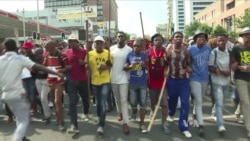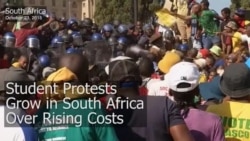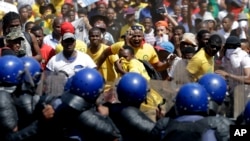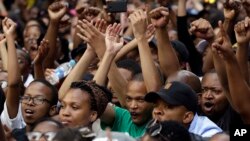South African students won a major victory Friday, after more than a week of protests against university tuition fee hikes shut down at least 15 universities and earned them a meeting with the president — and a promise.
President Jacob Zuma announced after meeting with student leaders and academics that universities would not increase tuition in the coming year. Students started protests last week at the University of the Witwatersrand over a proposed 10 percent fee hike.
“We agreed that there will be a zero increase of university fees in 2016,” Zuma said. “Discussions will continue looking at broader issues than the fees.”
WATCH: video of protests
But, he acknowledged, this decision is merely a bandage over a suppurating wound. He promised that the government will focus on other issues, like the idea of free education and the thorny race issues that underpin many discussions on education in South Africa.
But the meeting was not without turmoil. As leaders talked behind closed doors in Pretoria, police outside fired stun grenades and used water cannons after some student protesters tried to force their way onto the premises. That echoed violent scenes from earlier in the week, as police scuffled with students in Cape Town and arrested 29 of them during a march on the nation’s parliament.
Future confrontations not ruled out
That kind of scenario is exactly what University of Johannesburg graduate Peter Lekalakala fears as the students demands’ grow. The engineering graduate says he supports the move for free education, but that all sides in this fight — the students, the government and the universities — are dug into their positions. South Africa’s government says it simply can’t afford to support all students as much as they would like to. And universities say they are struggling to keep up with higher demand and rising costs without raising tuition.
And student groups have said they will not halt protests until all their demands are met.
“Obviously it’s going to lead to that point where they’re going to corner someone and someone is going to have to fight back,” Lekalakala said. “And I think in this case, it’s going to get violent. And unfortunately the students have numbers, but they don’t have the firepower, whereas the police do.”
Bigger issues
The movement is about much more than just university fees — it could signal a major political shift in a nation that has only been democratically ruled by one party, the ruling African National Congress.
Today’s college students belong to a generation known as “born-frees” — South Africans born after the end of apartheid in 1994. And many of them say they’re fed up after hearing years of promises from the government that they would bring equality and opportunities for all. More than two decades after the end of apartheid, economic inequality still falls largely along racial lines. For example, according to the last census, the average white family out-earns the average black family by a factor of six. The disparity is compounded further by the fact that the average black household is larger than the average white household.
Students on the streets of Johannesburg were quick to point out that much more needs to be done, and that this is much more than a haves vs. have-nots issue.
University of Johannesburg student Katlego Nduli says her family is middle-class. Nduli, whose first name means “success,” says she is struggling financially, too, because her family is deemed too wealthy for her to get the loans and scholarships she needs to fill the gap.
“The government claims that my parents have enough money for me not be able to be granted a bursary," she said. "But then, still, they’re also too poor for me to be able to afford university.”
But Nduli and her compatriots say they have youth and energy on their side and are determined to make their voices heard. And in a manner growing more pointed by the day, they are reminding their elders that they are very people who will become the nation’s next leaders.








